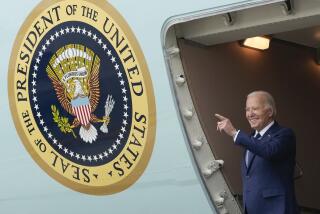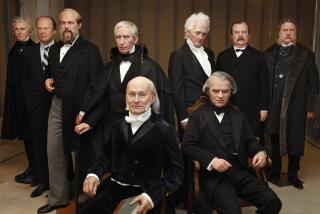The Past in Our Future
- Share via
Two centuries ago Alexander Hamilton wrote in The Federalist of the difficulty that the Constitutional Convention faced in creating the American presidency, a unique position in the political history of the world at that time. Today Americans are continuing to shape the presidency as they prepare to select the nation’s 41st Chief Executive.
The Federalist was a series of tracts--the editorial-page pieces of their day--designed to drum up support for ratification of the Constitution. In No. 68 Hamilton said the process that the Founders finally settled on for picking a President almost certainly assured Americans that the successful candidate would have the “requisite qualifications.”
Alas, Hamilton skimped on the details of these requisite qualifications, although he went to great lengths to tell Americans what the President would not be: He would not be a monarch. Besides, in 1787 it was virtually certain that George Washington would be the country’s first President. Every American was keenly aware of the great general’s abilities to lead. Washington would set the pattern.
Hamilton did write that the presidency almost certainly would be filled by “characters preeminent for ability and virtue.”
In the late summer of 1987 Americans are beginning to assess the requisite qualifications and apply them to the seven, and possibly more, Democratic candidates for President in 1988 and to half a dozen Republicans. The candidates will be subjected to a tedious process that may or may not accurately reveal their qualifications for the job.
George Washington and 39 others, up through incumbent Ronald Reagan, have brought a wide variety of character, talent and experience to the office. But today the qualifications for being President of the United States are virtually as vague as they were in 1787. For starters, however, Hamilton’s standards of ability and virtue provide a reasonable base. An issue of virtue, in fact, already has accounted for the elimination of one major candidate.
By and large, the 1988 field is able. Most of the candidates have considerable experience in government, including leadership positions at the national level. Most of them stress their ability to manage the government well, contrasting themselves in subtle and not-so-subtle ways with the current Administration. Americans often select their new Presidents in part by seeking strengths that compensate for weaknesses that they saw in their predecessors.
But, as the campaign progresses, American voters should think as well about the more general virtues and abilities demanded by rapidly changing times--the vague quality known as a sense of vision. The Reagan Administration delivered a form of instant gratification through two immediate goals: a quick arms buildup and the removal of governmental restraits from the economy. The focus has been on the present and the individual rather than on the future and the national community. President Reagan promised Americans that they could spend billions more for arms and have tax cuts, too. The result is a $2-trillion debt burden on future generations of Americans, a widening gap between the poor and the affluent and a sense that Americans do not feel very good about each other.
The next President must not shrink from these difficult problems. Washington was our first conservative President, but he also had a visionary concept of the role of government in America. In arguing for the need for a strong national government in 1783, Washington set down four elements that he said were essential to the well being of the United States. The first three were an indissoluble Union under one federal head, a sacred regard for public justice and the adoption of “a proper peace establishment.”
The fourth element was the need for a “pacific and friendly disposition” among the people that would induce Americans to forget their local prejudices, to make mutual concessions to the general prosperity and sometimes “to sacrifice their individual advantages to the interests of the community.”
The candidates for President in 1988 would do well to study Washington’s four points. The aspirant who can forcefully articulate the suitability of those goals in America today may well be the candidate who is best equipped to lead.
More to Read
Get the L.A. Times Politics newsletter
Deeply reported insights into legislation, politics and policy from Sacramento, Washington and beyond. In your inbox twice per week.
You may occasionally receive promotional content from the Los Angeles Times.







